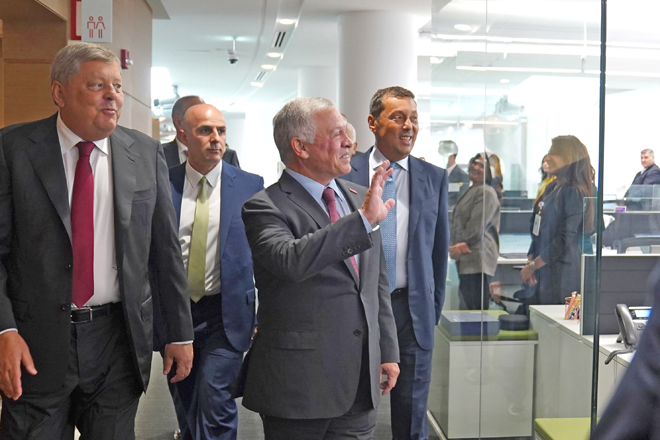You are here
IMF urges innovation to battle global growth slowdown
By AFP - Apr 02,2016 - Last updated at Apr 02,2016
WASHINGTON — Facing slowing growth in the global economy, the International Monetary Fund (IMF) called last week for policies that support research and development to promote innovation.
"Fiscal policy can play an important role in stimulating innovation through its effects on research and development [R&D], entrepreneurship, and technology transfer," the IMF said in a report ahead of its twice-yearly meeting in Washington in April.
Among its recommendations, the IMF estimated that businesses in advanced economies should invest 40 per cent more in R&D on average than they do currently, which could in the long run increase the gross domestic product (GDP) of their respective countries by 5 per cent, and in turn boost growth in the global economy through technology transfers.
Innovation is also a way to improve productivity amid concerns "that the global economy may be trapped in an era of mediocre growth", the report said.
"The slow growth in total factor productivity [TFP] is particularly worrisome," it added, referring to the part of output than cannot be explained by the amount of inputs, typically labour and capital, used in production.
Slow growth in TFP "explains a significant part of the overall decline in potential growth since the early 2000s in advanced economies, and more recently in emerging-market economies", warned the IMF, calling for structural reforms in labour and product markets.
According to IMF data, only 13 countries have R&D spending that is above 2 per cent of GDP: Australia, Denmark, Estonia, France, Finland, Germany, Iceland, Japan, South Korea, Switzerland, Sweden, the United States and French Guiana, an overseas department of France in northern South America.
Targeted budget policies may help to offset periods of weak economic growth when businesses encounter more difficulties in financing, the 188-nation institution said.
IMF experts highlighted that tax incentives for intellectual property rights, known in Europe as "box regimes", have mixed outcomes in promoting innovation and R&D.
Introduced in Ireland in the 1970s, box regimes have been adopted by 13 European countries, notably France, Belgium, the Netherlands and Britain. They are currently under discussion in the United States and India, the IMF remarked.
But, according to the institution's experts, they act more as a way for countries to attract revenues from patents, copyrights and trademarks than to encourage applications for intellectual property rights protection, thus innovation.
The IMF studied the impact of box regimes in France, Belgium, the Netherlands and Spain and concluded there was no effect on R&D spending in France and Spain, while gains were seen in Belgium and the Netherlands. It cited differences in design of the box regimes as a cause of the mixed results.
Overall, the IMF said, box regimes are not an efficient way to spur R&D in part because of potential "significant" foregone tax revenues from intellectual property.
Related Articles
FRANKFURT — The global economy's already modest prospects will decline further unless authorities take stronger action to boost growth, the
As research and development (R&D) investments help drive growth, create more jobs, and meet the future demands of societies and nations,
AMMAN — His Majesty King Abdullah on Tuesday inaugurated Hikma Pharmaceuticals’ new Middle East and North Africa headquarters in Amman.King












